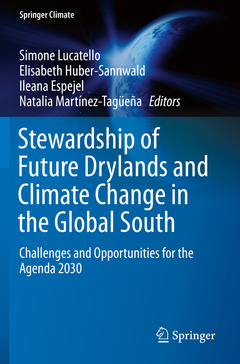Stewardship of Future Drylands and Climate Change in the Global South, 1st ed. 2020 Challenges and Opportunities for the Agenda 2030 Springer Climate Series

Chapter 1.- The construction and destruction of successful agricultural lands: case study of viticultural areas in Northern Mexico. Chapter 2.- Pastoralism and achievement of the 2030 Agenda for Sustainable Development: a missing piece of the puzzle. Chapter 3.- Trends in the use of groundwater in dry lands of Mexico: case of a complex urbanized socio.- ecosystem of the Chihuahua desert. Chapter 4.- The socio.- ecological systems approach to research the integrated aquifer management in an agricultural dryland in Mexico. Chapter 5.- Assessment of climate change impact on drought and flood regime using climatological data derived from GLDAS.- 1, GLDAS.- 2, and MERRA.- 2 over semi.- arid zones of northern Mexico: analysis of temporal patterns of precipitation. Chapter 6.- Understanding Drylands with a transdisciplinary and participatory approach: participatory observatories and the case of RISZA. Chapter 7.- Sustainable development Goals and drylands. Chapter 8.- Conservation and Development in the Mapimi Biosphere: a transdisciplinary and participatory project to understand climate change adaptation. Chapter 9.- Education for sustainable development (ESD): expert net as promoter of transdisciplinarity through the SDGs. Chapter 10.- The forced modernization of the Altiplano: disruption of the ecosystem function of the dryland zones in San Luis Potosí, Mexico. Chapter 11.- Sustainable development in modern times: forgotten native communities in northwestern México. Chapter 12.- Looking at the past to face the challenges for sustainable development in drylands: the protection of the biocultural heritage in the Tehuacán.- Cuicatlán Biosphere Reserve. Chapter 13.- The Agadir Platform: a tripartite transatlantic cooperation to achieve sustainable Dryland. Chapter 14.- The Atlas Workshops of Agdz, Morocco: a model region for a scientific.- artistic dialogue. Chapter 15.- Drylands, aridification and land governance in Latin America: a regional geospatial perspective. Chapter 16.- Vulnerability to the effects of climate change: coastal watersheds of arid Mexico. Chapter 17.- Desert experts through time: traditional hunter.- gatherers from Northern Mexico and its implications for resource management and governance. Chapter 18.- Governing drylands through Environmental Mainstreaming: how to cope with natural resources scarcity and climate change.
Dr. Simone Lucatello is a Professor-Researcher at the Research Institute Dr. José María Luis Mora (CONACYT) in Mexico City. He is a graduate of the London School of Economics and Political Science (LSE) in International Relations (MSc), and holds a PhD in Analysis and Governance of Sustainable Development from the International University of Venice, Italy. His research interests cover climate change, disaster risk management, environmental security and humanitarian aid. He collaborates with the California Global Energy Initiative, Water & Infrastructure Innovation Initiative at Stanford University, and is a visiting Professor at the School of Global Governance at the University of the Americas in Puebla. He is an associate researcher of the Climate Change Research Program (PINCC) of the UNAM, of several Mexican international programs and participates in academic networks on issues of international cooperation, security and sustainable development. He has collaborated with various programs of the United Nations (UNEP, UNODC, UNIDO, ECLAC), of the European Union (Europe Aid) in the Balkans, Central America and Mexico, and has been a visiting researcher at the Research Center in North America of the UNAM (CISAN-UNAM).
Dr. Elisabeth Huber-Sannwald is a Research Professor in the Division of Environmental Sciences at the Instituto Potosino de Investigación Cientifica y Tecnológica (IPICYT), San Luis Potosi, Mexico. She did her masters in Biology/Botany at the Botanical Institute of the University of Innsbruck, Austria and her PhD in Range Ecology at Utah State University, Utah, U.S. As postdoc at the Institute of Ecology, University of Buenos Aires she served as Scientific Officer of Focus 4 of the Global Change and Terrestrial Ecosystems (IGBP-GCTE) program. She is an expert in dryland ecosystem ecology with a focus on diversity and functioning of plant species, plant functional group
Addresses the challenges and opportunities facing future drylands in the global south
Presents case studies to assess the complexities of dryland socio-ecological systems
Offers transdisciplinary and participatory approaches to foster social learning and polycentric governance
Date de parution : 10-2020
Ouvrage de 359 p.
15.5x23.5 cm
Date de parution : 10-2019
Ouvrage de 359 p.
15.5x23.5 cm
Disponible chez l'éditeur (délai d'approvisionnement : 15 jours).
Prix indicatif 137,14 €
Ajouter au panier


